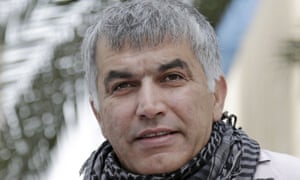
Human rights groups have written to 50 states urging them to call on the Bahraini authorities to release Nabeel Rajab, who is facing up to 15 years’ in jail for comments he made on Twitter.
Rajab has also been charged with “defaming the state” by publishing “false news... and malicious rumours that undermine the prestige of the kingdom” following the publication of an article by him on the op-ed page of the New York Times.
Twenty-two NGOs, including Human Rights Watch, Amnesty International and the Bahrain Institute for Rights and Democracy, want the 50 countries to “speak out on Bahrain’s continued misuse of the judicial system to harass and silence human rights defenders.”
All the states have been signatories to previous statements at the United Nations criticising Bahrain’s human rights violations. Among them are the UK, USA, the France and Switzerland.
While the US State Department has called for Nabeel Rajab’s release, many others have yet to do so.
A commons question, from an SNP MP, asking about Britain’s position on Rajab, elicited a reponse on Monday from foreign office minister Tobias Ellwood.
He said that the government had had “frank discussions with the government of Bahrain about human rights concerns both in public and in private”.
He said: “We urge the Bahraini authorities to respect the rights of all its citizens, and call on them to protect the universal rights of freedom of expression.”
Ellwood pointed out that the former foreign secretary, Philip Hammond, had spoken to the Bahraini foreign minister, Sheikh Khalid Bin Ahmad Al Khalifa, in June.
He also said that an official from the British embassy in Bahrain has attended all of Rajab’s hearings to date and “we will continue to monitor his case closely and raise concerns with the government of Bahrain.”
The UN high commissioner for human rights, Zeid Ra’ad Al Hussein, raised concerns about Bahrain’s human rights record during his opening statement at the 33rd Human Rights Council on Tuesday.
He said: “I am concerned by harrassment and arrests of human rights defenders and political activists [in Bahrain], and legislation which enables revocation of citizenship without due process...
“The past decade has demonstrated repeatedly and with punishing clarity exactly how disastrous the outcomes can be when a government attempts to smash the voices of its people, instead of serving them.”
Rajab, the president of the Bahrain Center for Human Rights (BCHR), has been held in pre-trial detention since 13 June, mostly in solitary confinement. His health has deteriorated as a result.
Since 2011, Rajab has faced multiple prosecutions and prison sentences for his activism. He was placed on a travel ban in 2014 and has been unable to leave the country.
In his New York Times article, headlined “a letter from a Bahraini jail”, Rajab wrote of there being some 4,000 political prisoners in Bahrain.
He asked: “Is this the kind of ally America wants? The kind that punishes its people for thinking, that prevents its citizens from exercising their basic rights?”
In March, Bahrain refused to renew a licence to work for a France24 journalist, Nazeeha Saeed. In July, she was then prosecuted for “working illegally”.
In August, the Bahrain embassy in London told the Guardian: “Bahrain’s commitment to media freedom is fully consistent with the values we share with the United Kingdom, and indeed with the ambassador’s own views on the issue.”
The ambassador, Sheikh Fawaz bin Mohammad Al-Khalifa, is a member of Bahrain’s royal family and a former head of Bahrain’s information affairs authority (IAA).
Sayed Ahmed Alwadaei, director of advocacy for the Bahrain Institute for Rights and Democracy (BIRD) said: “We want Sheikh Fawaz to explain how his government shares the UK’s free press values when it is busy prosecuting Nabeel Rajab for an opinion piece which anyone can read online.
“The Bahraini state is an enemy to the internet and free speech and must be condemned by its ally, the United Kingdom.”
Rajab’s next court session has been set for 6 October, when he is expected to be sentenced.